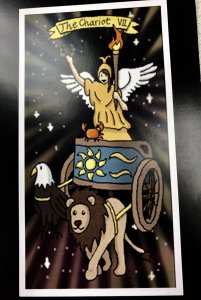Presented By: Institute for the Humanities
"Plato's Self-Moving Myth. The circulation of Plato's charioteer from late antiquity to the Renaissance"
Sara Ahbel-Rappe, Professor of Classical Studies

In this lecture, Ahbel-Rappe discusses her book in progress, in which she investigates the reception of Plato’s Phaedrus, and especially the famous myth of the soul (Phaedrus 246-249), from late antiquity to the Renaissance, tracing the phenomenon of this text’s migration into exegetical traditions and languages far removed from the original site of Plato’s dialogue. The study relies on the core idea of the text network and asks if the text itself an agent of its own migration.
Recent work on text networks (Selden, McCracken, Lopez) investigating such multi-linguistic migratory texts as the Alexander Romance, Life of Aesop, or Barlaam and Josephat, focus on the trajectory of a text, a text that takes on its life and makes its home as an immigrant in foreign lands, among foreign tongues. What astonishes about these texts is that they often perform their very subject matter, and it has gone unnoticed that the myth of the charioteer in Plato’s Phaedrus fits this profile. What she means is that the myth is an allegory for the soul, whereas Plato defines the soul at Phaedrus 246 as a self-mover. The story itself, a tale of the embodied soul being out of place in the world and wandering through cycles of birth and death, finds its textual analogue as the text takes on a corporeality, a presence in space and time, and a diffuse, variegated voicing.
Former Humanities Institute fellow Sara Ahbel-Rappe is Professor of Classical Studies. She has written several books that focus on the trajectory of the Platonic tradition, from the Sokratikoi Logoi to the "last pagan professor," Damascius. She is the recipient of fellowships from the Institute for Advanced Study, the Mellon Foundation, and Center for Hellenic Studies.
Recent work on text networks (Selden, McCracken, Lopez) investigating such multi-linguistic migratory texts as the Alexander Romance, Life of Aesop, or Barlaam and Josephat, focus on the trajectory of a text, a text that takes on its life and makes its home as an immigrant in foreign lands, among foreign tongues. What astonishes about these texts is that they often perform their very subject matter, and it has gone unnoticed that the myth of the charioteer in Plato’s Phaedrus fits this profile. What she means is that the myth is an allegory for the soul, whereas Plato defines the soul at Phaedrus 246 as a self-mover. The story itself, a tale of the embodied soul being out of place in the world and wandering through cycles of birth and death, finds its textual analogue as the text takes on a corporeality, a presence in space and time, and a diffuse, variegated voicing.
Former Humanities Institute fellow Sara Ahbel-Rappe is Professor of Classical Studies. She has written several books that focus on the trajectory of the Platonic tradition, from the Sokratikoi Logoi to the "last pagan professor," Damascius. She is the recipient of fellowships from the Institute for Advanced Study, the Mellon Foundation, and Center for Hellenic Studies.